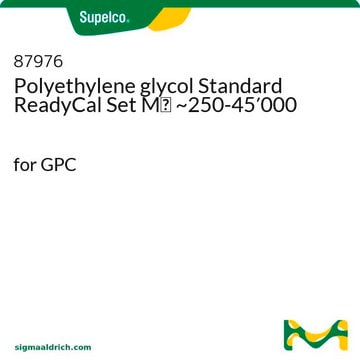81292
Poly(ethylene glycol)
analytical standard, for GPC, 4,000
Synonym(s):
PEG
Sign Into View Organizational & Contract Pricing
All Photos(1)
About This Item
Linear Formula:
H(OCH2CH2)nOH
CAS Number:
MDL number:
UNSPSC Code:
12352104
PubChem Substance ID:
NACRES:
NA.24
Recommended Products
grade
analytical standard
for GPC
Quality Level
shelf life
limited shelf life, expiry date on the label
mol wt
Mn ~4120
Mp ~4450
Mw ~4240
technique(s)
gel permeation chromatography (GPC): suitable
Mw/Mn
~1.03
application(s)
cleaning products
cosmetics
food and beverages
personal care
format
neat
storage temp.
2-8°C
SMILES string
C(CO)O
InChI
1S/C2H6O2/c3-1-2-4/h3-4H,1-2H2
InChI key
LYCAIKOWRPUZTN-UHFFFAOYSA-N
Looking for similar products? Visit Product Comparison Guide
General description
Poly(ethylene glycol) (PEG) is regarded as the gold standard for stealth polymers in polymer based drug delivery. PEGs and their anionic or non-ionic derivatives are widely used in cosmetic products.
Application
PEG is known to modify enzymes and proteins for the preparation of improved therapeutic agents.
Storage Class
11 - Combustible Solids
wgk_germany
WGK 1
flash_point_f
Not applicable
flash_point_c
Not applicable
ppe
Eyeshields, Gloves, type N95 (US)
Choose from one of the most recent versions:
Already Own This Product?
Find documentation for the products that you have recently purchased in the Document Library.
Customers Also Viewed
Safety assessment on polyethylene glycols (PEGs) and their derivatives as used in cosmetic products.
Fruijtier-Polloth C.
Toxicology, 214(1-2), 1- 38 (2005)
C Woghiren et al.
Bioconjugate chemistry, 4(5), 314-318 (1993-09-01)
Monomethoxypolyethylene glycol (mPEG) of average molecular weight 5000 was transformed in a series of synthetic steps to a new activated form of PEG, a stable thiol-protected intermediary, for reaction with cysteine residues in proteins under mild conditions to produce PEG--protein
Poly (ethylene glycol) in drug delivery: pros and cons as well as potential alternatives.
Knop K, et al.
Angewandte Chemie (International Edition in English), 49(36), 6288-6308 (2010)
I L Konorova et al.
Patologicheskaia fiziologiia i eksperimental'naia terapiia, (4)(4), 7-9 (1991-07-01)
The search for antiaggregatory compounds is undertaken, as a rule, under in vitro conditions which do not reflect the dynamics of the real process. The present work deals with study of the peculiarities of the development of the collagen induced
Mark A Rice et al.
Acta biomaterialia, 5(1), 152-161 (2008-09-17)
Ultrasound has potential as a non-destructive analytical technique to provide real-time online assessments of matrix evolution in cell-hydrogel constructs used in tissue engineering. In these studies, chondrocytes were encapsulated in poly(ethylene glycol) hydrogels, and gel degradation was manipulated to provide
Our team of scientists has experience in all areas of research including Life Science, Material Science, Chemical Synthesis, Chromatography, Analytical and many others.
Contact Technical Service

